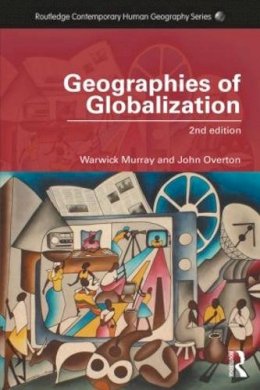Feedback on the second edition: A comprehensive, up-to-date and eminently readable critical exploration of the idea that as globalization marches on, geography and its core principles matter more than ever for understanding the process, its challenges, and its impacts on places from the local to the global scale. - Emeritus Professor Peter Daniels, Department of Geography, University of Birmingham, UK ‘Genuinely global, unlike much of its competition, the new edition of Geographies of Globalization continues to provide an extremely well-written, enjoyable, thoughtful and occasionally provocative analysis of globalization. Already highly successful, the book is well on the way to becoming a classic.’- Professor John Connell, School of Geosciences, University of Sydney, Australia 'A first rate introduction to globalization encompassing economic, cultural, political and environmental processes and perspectives. This accessible and well-structured textbook combines a critical discussion of various theories of globalization with wide-ranging and up to date examples, presenting globalization as a dynamic and geographically unequal phenomenon that is central to understanding the modern world.' - Professor Michael Woods, Department of Geography and Earth Sciences, Aberystwyth University, UK 'Globalization became a buzzword in the 1990s. Two decades on and writing from the southwestern Pacific, Warwick Murray and John Overton provide an excellent review of the debates: looking backwards, forwards and beyond the polemics' - Professor James D Sidaway, Department of Geography, National University of Singapore, Singapore Reviews of the first edition: 'Geographies of Globalization is a must read. It offers reasons why geographers have been marginal to the wider globalization debates, an agenda for rectifying this issue, and a call to arms to geographers on how to make their discipline distinct and valuable to the debates.' - Canadian Geographer Review 'A valid contribution to the globalisation literature as an introductory level or foundation text, combining key themes and empirical case studies with some key theoretical ideas. As part of the Routledge Contemporary Human Geography Series the book serves its role as a teaching aid, providing a concise introduction to the subject while is also amenable to delivery as, or as an accompaniment to, an undergraduate lecture courses.'- Tim Vorley, University of Leicester 'The book is very well written, carrying the reader along with all the zest and enthusiasm that characterise a winner of one of the 2006 national tertiary teaching awards. Reading it often seems like being in a high-energy classroom.' - New Zealand Journal of Social Sciences 'Geographies of Globalization is written in a very clear, accessible and concise manner and is a book that offers students something of a route-map through the uncertainty, confusion and misunderstandings that surround this now widely debated phenomenon.' - New Zealand Geographer, 2006 'This book will travel well beyond the discipline of geography and will be equally useful for students of a range of other social science disciplines.' - Marcus Power, Department of Geography, University of Durham 'Geographies of Globalization is a must read. It offers reasons why geographers have been marginal to the wider globalization debates, an agenda for rectifying this issue, and a call to arms to geographers on how to make their discipline distinct and valuable to the debates.' - Canadian Geographer Review 'I am certain that Geographies of Globalization will make an excellent text for many geography courses that focus on globalization' - Annals of the AAG Feedback on the second edition: A comprehensive, up-to-date and eminently readable critical exploration of the idea that as globalization marches on, geography and its core principles matter more than ever for understanding the process, its challenges, and its impacts on places from the local to the global scale. - Emeritus Professor Peter Daniels, Department of Geography, University of Birmingham, UK ‘Genuinely global, unlike much of its competition, the new edition of Geographies of Globalization continues to provide an extremely well-written, enjoyable, thoughtful and occasionally provocative analysis of globalization. Already highly successful, the book is well on the way to becoming a classic.’- Professor John Connell, School of Geosciences, University of Sydney, Australia 'A first rate introduction to globalization encompassing economic, cultural, political and environmental processes and perspectives. This accessible and well-structured textbook combines a critical discussion of various theories of globalization with wide-ranging and up to date examples, presenting globalization as a dynamic and geographically unequal phenomenon that is central to understanding the modern world.' - Professor Michael Woods, Department of Geography and Earth Sciences, Aberystwyth University, UK 'Globalization became a buzzword in the 1990s. Two decades on and writing from the southwestern Pacific, Warwick Murray and John Overton provide an excellent review of the debates: looking backwards, forwards and beyond the polemics' - Professor James D Sidaway, Department of Geography, National University of Singapore, Singapore Reviews of the first edition: 'Geographies of Globalization is a must read. It offers reasons why geographers have been marginal to the wider globalization debates, an agenda for rectifying this issue, and a call to arms to geographers on how to make their discipline distinct and valuable to the debates.' - Canadian Geographer Review 'A valid contribution to the globalisation literature as an introductory level or foundation text, combining key themes and empirical case studies with some key theoretical ideas. As part of the Routledge Contemporary Human Geography Series the book serves its role as a teaching aid, providing a concise introduction to the subject while is also amenable to delivery as, or as an accompaniment to, an undergraduate lecture courses.'- Tim Vorley, University of Leicester 'Geographies of Globalisation is written in a very clear, accessible and concise manner and is a book that offers students something of a route-map through the uncertainty, confusion and misunderstandings that surround this now widely debated phenomenon.' - New Zealand Geographer 2006 'This book will travel well beyond the discipline of geography and will be equally useful for students of a range of other social science disciplines.' - Marcus Power, Department of Geography, University of Durham

